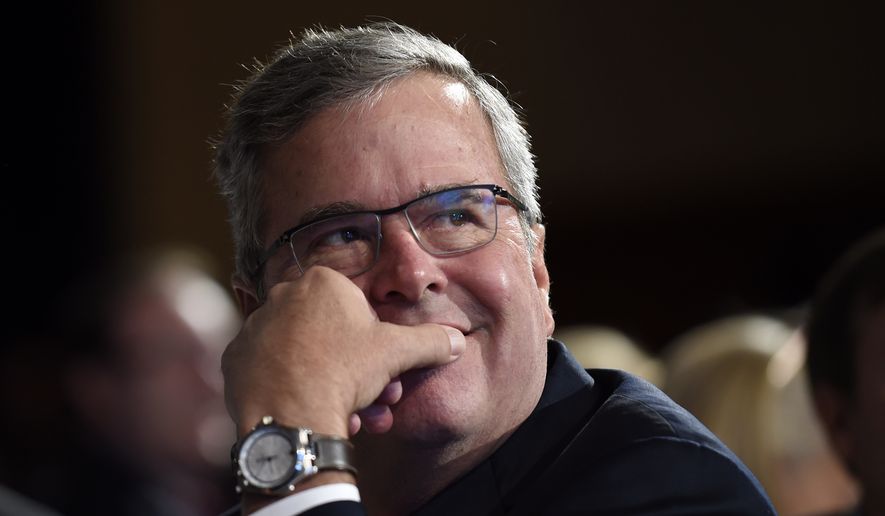Even before the 2016 presidential campaign truly begins, division lines between Jeb Bush and his potential foes in the Republican primary already have been drawn.
The former Florida governor signaled in a Washington speech Thursday that he is prepared to fight the base in his own party over the increasingly unpopular Common Core education standards, arguing that they are vital to improving the quality of education and, by extension, improving children’s chances to succeed in today’s economy.
Mr. Bush’s outspoken and unwavering support for the K-12 Common Core standards almost surely will put him at odds with many conservative voters should he decide to seek the White House. Polls consistently have shown Republican voters turning against the standards in droves, and previous Common Core proponents — such as Louisiana Gov. Bobby Jindal — have disavowed the system, which has been adopted in more than 40 states but has either been scrapped or is under review in a number of them.
While Mr. Bush tried to extend an olive branch to Common Core opponents, giving a nod to states’ freedom to make their own decisions, he refused to back down from the broader fight.
“We should be willing to experiment. We should always look to improve our thinking based on the evidence. This is why the debate over the Common Core State Standards has been troubling,” he said Thursday in a keynote address at a gathering of Foundation for Excellence in Education, a group he founded after his tenure as Florida governor ended in 2007.
“I respect those who have weighed in on all sides of this issue. Nobody in this debate has a bad motive. But let’s take a step back from this debate for a second,” he continued. “Only a quarter of our high school graduates who took the ACT are fully prepared for college. More than half who attend community college need to take some kind of remedial course. Six hundred thousand skilled manufacturing jobs remain unfilled because we haven’t trained enough people with those skills. And almost a third of high school graduates fail the military entrance exam. Given this reality, there is no question we need higher academic standards and — at the local level — diverse high-quality content and curricula. And, in my view, the rigor of the Common Core State Standards must be the new minimum in classrooms.”
But Mr. Bush’s passionate support for Common Core is not shared among many Republicans. A Gallup poll released in late August found that 59 percent of Americans oppose Common Core in their schools; a whopping 76 percent of Republicans held that view, compared with just 38 percent of Democrats. Just 17 percent of Republicans said they support the standards.
While surveys also show that many Americans still simply don’t know much about Common Core, the standards are becoming especially unpopular among conservatives at the grass-roots level, presenting a potentially serious political challenge for Mr. Bush to overcome in a presidential campaign.
“I think he’s got a big problem,” said Neal McCluskey, associate director of the Center for Educational Freedom at the libertarian Cato Institute. “There are a lot of libertarians and general conservatives who don’t like the Common Core … the general trend has been the more people learned [about] and gotten to know something about Common Core, the lower the rate of approval. Some people don’t like the standards themselves. Some people don’t like the federal coercion. Some people don’t like the testing. There are a whole lot of things connected to this that people don’t like.”
The standards do not constitute a national curriculum; instead, they lay out basic facts and principles that students are expected to master by the end of each grade level.
Common Core was crafted by the National Governors Association and Council of Chief State School Officers. The Obama administration did not have a direct hand in writing the standards, but the White House has become a top Common Core cheerleader, which has soured some conservatives.
Education Department grants under the Race to the Top program, for example, were tied to the implementation of college-and-career-ready standards virtually identical to the Common Core.
Mr. Jindal at one time was a major supporter. Now he’s suing the federal government over Common Core, claiming that the administration has tried to coerce states into adopting it, thus violating the 10th Amendment.
A conservative backlash also has emerged in North Carolina, Michigan, Indiana and elsewhere.
In Tennessee, Gov. Bill Haslam, a Republican and also a Common Core backer, has agreed to launch a full-on review of the standards.
Subsequently, state lawmakers introduced legislation that would establish a new state commission tasked with writing standards solely for Tennessee.
“For Tennessee to remain economically competitive in the years ahead, it is crucial for our state to establish high Tennessee standards rooted in Tennessee values,” Lt. Gov. Ron Ramsey, a Republican, recently told the Tennessean newspaper. “We are a unique and exceptional state. We need to make sure our standards are equally unique and exceptional.”
While Mr. Bush has shown no indication he’s ready to jump off the Common Core bandwagon, he did give a nod to Mr. Ramsey and other state officials who want to pull their students out of the system.
“For those states choosing a path other than Common Core, I say this: Aim even higher. Be bolder. Raise standards and ask more of our students and the system. Because I know they have the potential to deliver it,” he said Thursday. “Even if we don’t all agree on Common Core, there are more important principles for us to agree on.”
• Ben Wolfgang can be reached at bwolfgang@washingtontimes.com.




Please read our comment policy before commenting.